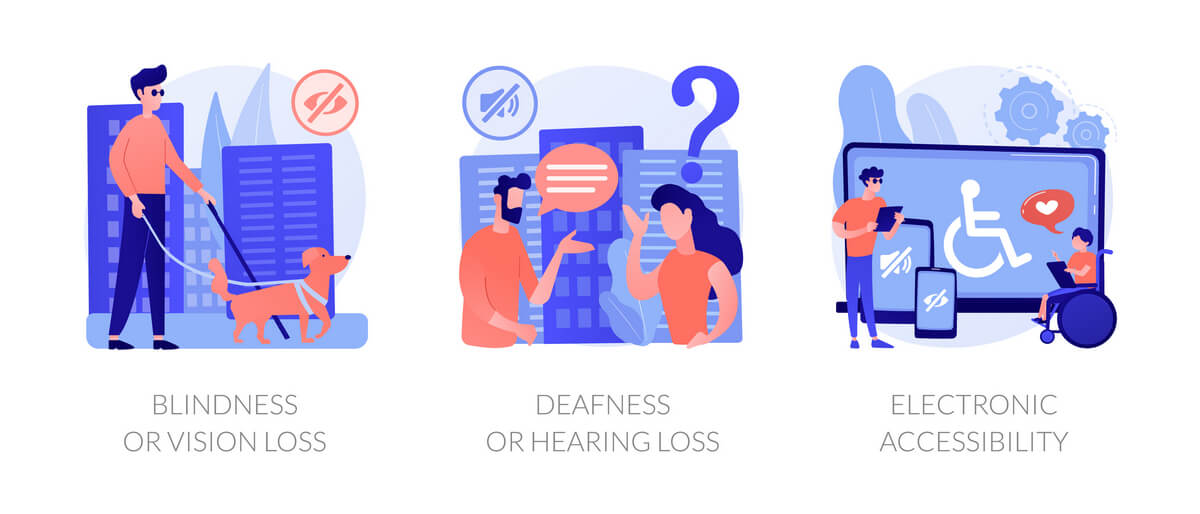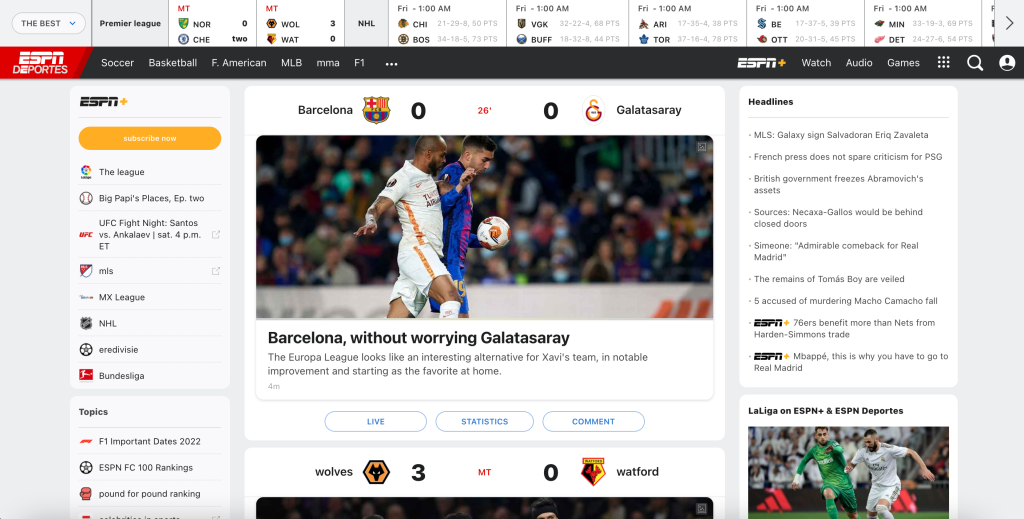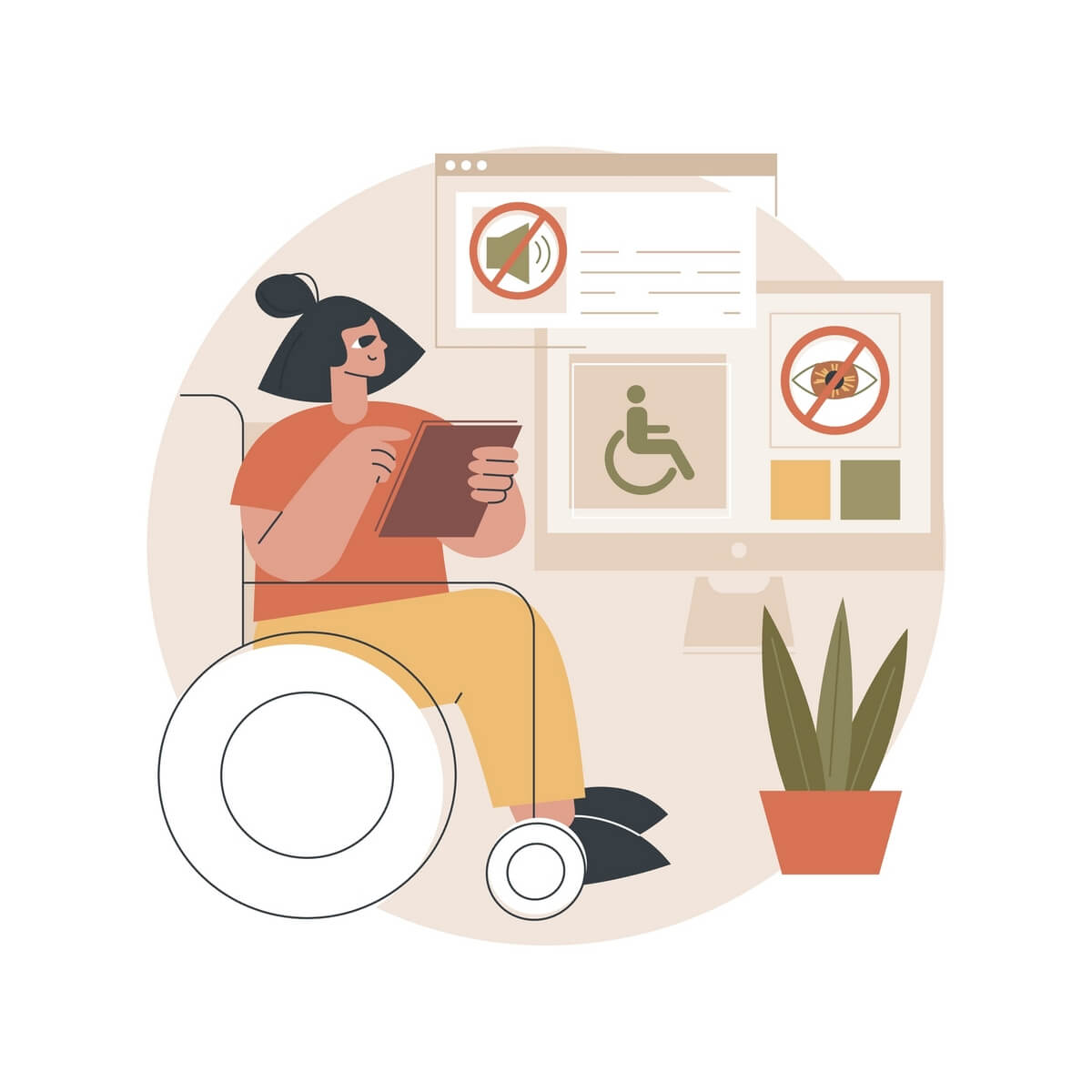An ADA-compliant real estate website is crucial for great UX and to avoid expensive discrimination lawsuits. Find out how you can protect yourself and your clients with improved website accessibility.
Branding & Design Industry Insights
Agents are being sued left and right for an internet law that most don’t even know about: The Americans With Disabilities Act. The American Disabilities Act (ADA) legally requires websites to be accessible for users of all abilities. In fact, real estate agents who aren’t aware of ADA compliance or its requirements, are at risk of being brought to court on premises of discrimination.
The internet is the first place prospective clients will go to learn more about your business, your reputation, and what results you can create for them. Owning a real estate website that isn’t accessible to clients of all physical abilities is undeniably limiting – not only for your business but to the housing options of deserving clients.
So how do we define web accessibility? And what do you need to do to stay on good terms with the ADA?
Here’s how real estate agents can protect their business and better serve their clients with an accessible real estate website.
What is ADA Compliance?
You may have heard about the Americans with Disabilities Act in relation to physical, public spaces. It’s easy for people with all abilities to identify an accessible public area. Around your community, you are likely used to seeing braille, elevators, wheelchair ramps, automatic doors and more. Online accessibility, on the other hand, is not nearly as easy to see – especially for people without disabilities.
According to the ADA, websites need to be accessible for blind and deaf users who may need to navigate by voice, screen, readers, or other assistive devices. While that flashy Gif may look attention grabbing or your monochrome, low-contrast font may be “modern”, it’s important to ask if users with all abilities will have the same experience.
The issue many website owners run into is that the guidelines are still being developed, and at the moment, they’re not completely clear. Real estate agents have found that the best way to double-check ADA compliance is by referring to the Web Content Accessibility Guidelines (WCAG). While this isn’t a legally-binding set of rules, it’s the best reference point for agents looking to improve their accessibility.

Within these guidelines there are three, defined levels of Accessibility: A, AA, and AAA. When it comes to real estate websites, your aim should be Level AA Compliance.
4 Broad AA Principles for Real Estate Websites
Perceivable: Your website should be available to hearing and vision impared users. This means that assistive technologies can easily read and translate your web content so that users have a full experience, comparable to that of an able-bodied user.
Operable: There is no need for your FAQ page to be chalk-full of drop-down text blocks. Keep it simple. Users should be able to gather information easily and interact with each element of your website without getting lost or overworked in the process.
Understandable: As a real estate agent, you are offering a particular service with a very clear end goal: to help your client sell or buy a property. If you want to achieve the highest level of success, your web design and web content choices should stem from that goal. Ambiguous content that is abstract and disorganized, actually goes against what you originally set out to achieve. Being understandable is always more important than being flashy.
Robust: Have you tried to navigate your website using a digital reader? Not many people have. The Web Accessibility Initiative has a ton of resources that you can use to check the accessibility of different elements of your website. A robust website is defined as one that easily integrates with most types of assistive technology, so don’t skip this step.
Did you haphazardly put your website together in a hurry? We understand that for many real estate agents, formatting their website is just something to check off the list. But an accessible website should be a priority. Our AgentFire web designers can build a custom website with accessibility in mind. Plus, you can ask them all you want to know about accessible websites.

Why is ADA Compliance Important?
User Experience
There are over 1 billion people in the world with disabilities and ¼ people in the United States are currently dealing with disabilities. If you’re not applying accessibility principles to your website, you could only be reaching 75% of your target clientele, as opposed to 100%.
Disabilities don’t necessarily refer to severe physical limitations, they also include minor physical challenges such as diminishing eyesight and hearing with age, so keep your definition of accessibility broad. Many web owners who optimize their site for accessibility find that it enhances the experience for all of their web visitors; lowering bounce rate and driving traffic.
Think of it like this: automatic doors were invented for wheelchair accessibility, but we all benefit from them. Even if you have no trouble walking or reaching the door handle, automatic doors relieve you of having to open a heavy door with arms full of groceries or a hot coffee. When we keep a vulnerable part of our community in mind, we all benefit.
On a technical level, ADA-compliant websites are easier for search engines to crawl and in turn, to index your website. With a properly indexed website, you are more likely to receive heavy traffic and generally improve SEO.

Legal Conflicts
There are tons of legality concerns when it comes to purchasing or selling a house – but most real estate agents don’t think of their website as one of them. In recent years, more and more real estate agents have been sued by plaintiffs who claim that their access to fair housing was restricted by a crappy real estate website. A fair housing violation is a serious offence and your reputation may be affected as a result. It’s challenging to legally define what a non-compliant website is. Yet, if a user with disabilities can’t access the main features on your website, they could have grounds to sue you on the basis of ADA.
As early as 2016, MLS CEO, Shelly Specchio brought ADA web compliance to the forefront. She announced that the Northern Nevada Region MLS had been charged with disability discrimination, based on their website.
Leading real estate brokerage, Compass Real Estate, also struggled with legal issues related to web accessibility. In 2018, a lawsuit was filed against them. The suit claimed that the lack of alt text in images made it difficult for the plaintiff to find their location and office hours. Vital aspects of real estate business, such as this, portals to pay rent online, access important documents, and more – are examples of where accessibility is especially important.
How to Improve ADA Compliance
Solve Common Web Accessibility Barriers
On real estate websites, there are a few specific concerns that affect disabled web users:

Items in a menu should be listed in a logical order based on your website’s most common functions. Additionally, it should be clear which page of the menu the user is currently viewing.
The website above is a great example of a simple and readable home menu. We worked with our client, Aldo and Associates to develop an accessible website that assistive devices can easily skim through.
For visually impaired users, alt text and image captions can be very helpful. Alt text tells users what can be seen in the picture – even if they can’t see it themselves. You can edit alt text by going into the image details and accurately describing what is in the picture.
Screen readers will often scan a page and pull up all of the links in an ordered list for the user. Links named “click here” make it extremely difficult for the user to know what they are clicking into. Your link’s text should clearly state what your users are clicking and help them to understand the context.

Take a look at the website above. What do you think it would sound like as a digital reader is trying to communicate all of this scattered information in a logical way? Chances are, the reader would have no idea where to start or end.
As we mentioned earlier in the text: simplicity is key. Your layout should follow a logical and natural path based on your user’s interests. Consistent and organized are two key words you should keep in mind. Excellent layouts are our specialty at AgentFire. We’ve put together hundreds of accessible and visually appealing, effective websites for some of the top producing real estate agents in the country. If you’re interested in how your website can be exponentially improved, speak with one of our web designers for free.

ADA Compliance Addon
At AgentFire we offer our clients an inexpensive and easy ADA solution: the ADA compliance addon. With this addon, our clients can adjust font sizing, contrast, color, allow text to speech and more. Simply throw the addon in your cart or purchase it through our marketplace. The best part of this addon? It’s only $10 a month.
Dive Deeper Into the Community
Go a step further and get to know the organizations in your hyperlocal area that are passionate about the disabled community. Volunteering with an organization, for example, is a great way to let people know that you cater to clients of all abilities and are familiar with their concerns. Plus, you can gain an up-close look at how you can better serve your community and hopefully gain some referrals.
Set Up an Accessibility Webpage
Even with your best effort, some prospective clients may run into unforeseen accessibility issues. To avoid further conflict, consider including a feedback form or email address on your website that allows users to suggest what features should be added or improved for accessibility sake.
For further protection, create a webpage dedicated exclusively to accessibility concerns. This page can be simple, with mostly text, but it should outline your commitment to accessibility and openness to improvement. Here’s a short template you can use:
Accessible Webpage Template
Dear {insert brokerage name} clients,
{Insert brokerage name} aims to provide a pleasant and user-focused experience for all of our online visitors. To that end, we are always looking for ways to improve our web accessibility for all of our clients and guests with disabilities. If you are having trouble navigating, viewing, or generally accessing content on these pages, please reach out to our {insert preferred contact here} at {insert email address here} or {insert phone number here).
It is our priority to ensure that you have access to all of the tools and resources you need. We encourage any and all suggestions for improving our website’s accessibility. Please do not hesitate to reach out with any concerns.
Thank you!
The (Insert brokerage name here) Team
Conclusion
Your website is the first point of contact for most of your prospective clients. It’s your responsibility to ensure that all potential clients have the same enjoyable experience on your website. Anything below the WCAG guidelines may put you at risk of losing clients and even being dragged into a lawsuit. When you put the information and steps above into practice, you minimize the countless negative consequences of an inaccessible website.
